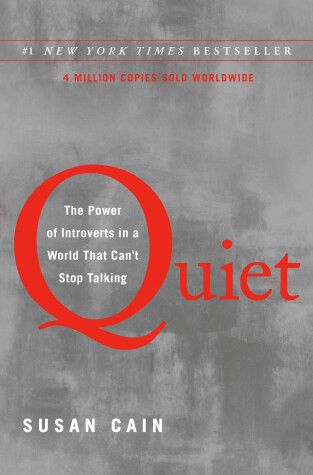
#1 NEW YORK TIMES BESTSELLER • Experience the book that started the Quiet Movement and revolutionized how the world sees introverts—and how introverts see themselves—by offering validation, inclusion, and inspiration
“Superbly researched, deeply insightful, and a fascinating read, Quiet is an indispensable resource for anyone who wants to understand the gifts of the introverted half of the population.”—Gretchen Rubin, author of The Happiness Project
ONE OF THE BEST BOOKS OF THE YEAR—People, O: The Oprah Magazine, Christian Science Monitor, Inc., Library Journal, Kirkus Reviews
At least one-third of the people we know are introverts. They are the ones who prefer listening to speaking; who innovate and create but dislike self-promotion; who favor working on their own over working in teams. It is to introverts—Rosa Parks, Chopin, Dr. Seuss, Steve Wozniak—that we owe many of the great contributions to society.
In Quiet, Susan Cain argues that we dramatically undervalue introverts and shows how much we lose in doing so. She charts the rise of the Extrovert Ideal throughout the twentieth century and explores how deeply it has come to permeate our culture. She also introduces us to successful introverts—from a witty, high-octane public speaker who recharges in solitude after his talks, to a record-breaking salesman who quietly taps into the power of questions. Passionately argued, impeccably researched, and filled with indelible stories of real people, Quiet has the power to permanently change how we see introverts and, equally important, how they see themselves.
I tend to think there are many misconceptions around introverts; we live in a world that seems to praise extroverts. Susan Cain tries to help people understand the importance of introverts and why we need a balance between the two personality traits. Susan is an introvert herself and found her job as a lawyer expected an extroverted personality. However embracing her introversion, she was able to prove herself a valuable employer and lawyer; so much so that she went on to become a negotiations consultant.
Quiet is a book that seeks out to explain the need for introverts, while also looking at the history between these two personality types. I myself am extremely introverted and my Myers–Briggs Type Indicator is INTJ (this can change over time but I will not go into that at the moment). I found it useful to understand the history in how society deals with introverts; some of which still feels very relevant today. I remember reading sections focusing on the 1950s and 60s, thinking this happened to me and is still happening in today’s society. This leaves me to think that people do not have an understanding on the personalities and how to manage introverts.
Susan Cain goes into a lot of detail with suggestions on how to fit into such an extroverted world, from developing a pseudo-extroverted personality to finding a quiet place to work. Obviously it does depend on your different situations but I think there were some interesting ideas to implement. She also goes into the problems with open offices and productivity levels as well as the extroverted nature of church. I was surprised by just how much this book covered.
I really enjoyed Quiet and feel like I learnt a lot, however it just makes me want to learn more, especially about the history (it is a vicious cycle). I want to give this book to my parents because I think they might actually benefit in learning about the topic. In fact I want to give this book to everyone, I feel like it is an important topic and we need to know that people are different and need to be treated differently. This is another book to fulfil my passion for learning about psychology and I would happily take some recommendations based on this book.
This book originally appeared on my blog; http://www.knowledgelost.org/book-reviews/genre/non-fiction/quiet-by-susan-cain/
Reading updates
-
Started reading
-
20 September, 2015:
Finished reading
-
20 September, 2015:
Reviewed
